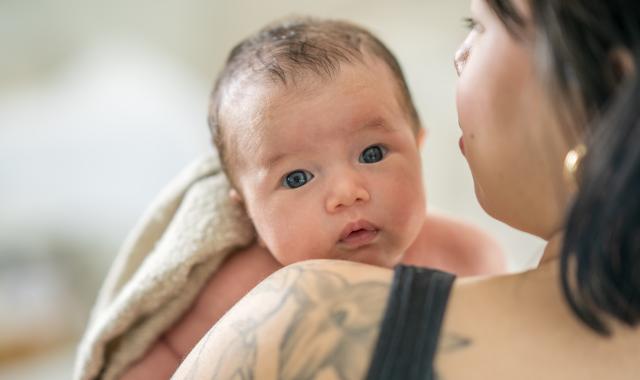Live seminars
The live seminars program for the Annual Health Professional Seminar Series 2026 - Breastfeeding: care that continues is available now
Recordings will be available as part of the online program - from 31 March to 31 May 2026.
Live seminar registrations will automatically upgrade to the online program at no additional cost.

Registrations open
7.45 am
Welcome and introduction
8.30 am
Bec Jenkinson
8.45 am The hidden hurdle: weight stigma and its impact on breastfeeding journeys
Weight stigma in maternity care doesn’t stop at birth; it can undermine breastfeeding confidence and access to support. Through the RADIANT study, we listened to 65 women and 24 clinicians, then co-created national Best Practice Principles for weight-inclusive care. This talk shares stories and strategies for moving beyond BMI toward respectful, evidence-based care that empowers women to feed their babies with confidence.
Monica Hogan
9.45 am Beyond the first latch: managing tongue tie for ongoing breastfeeding success
Breastfeeding challenges linked to tongue tie require ongoing support from health professionals, extending beyond the initial diagnosis. The focus includes oral function, maternal experience, and feeding outcomes over time, with practical strategies for collaborative care, post-frenotomy follow-up, and empowering families. Designed for lactation consultants, midwives, GPs, and allied health professionals aiming to foster long-term breastfeeding success.
Morning tea
10.45 am
Treasure McGuire
11.15 am Enhancing or inhibiting supply: a pharmacological exploration
Pharmacological modulation of lactation is increasingly seen in clinical practice, whether to support breastfeeding or to suppress milk production. This session explores the physiology of lactation, reviews the mechanisms, efficacy, and safety of both pharmaceutical and herbal galactagogues and explores clinical considerations for lactation suppression. Ethical and regulatory implications of off-label prescribing to alter milk supply will be discussed, emphasising informed consent and evidence-based decision making.
Sue Smith
12.15 pm Strength, scars, and sustenance: transforming burn recovery through motherhood and love
Navigating burn survivorship and motherhood involves understanding the physical and emotional changes that influence recovery, lactation, and maternal identity. This session will examine the intersection of burns, breastfeeding, and motherhood through the lens of philia, eros, and agape love to support compassionate, person-centred care. It aims to empower mothers to overcome barriers and nurture healing for themselves, while enriching the lives of their infants.
Lunch
1.15 pm
Dr Nina Chad
2.15 pm Nutritional management for infants under 6 months at risk of poor growth and development, WHO
This presentation introduces WHO implementation guidance on nutritional management of infants under 6 months at risk of poor growth and development, including those with severe malnutrition. For the first time, WHO is providing practical guidance on rebuilding or maintaining exclusive breastfeeding to inform service design and delivery. The session will provide a summary of the guidance and consider its relevance to the Australian context.
Treasure McGuire
3.15 pm Unpackaging contraception: breastfeeding and beyond
Navigating contraception postpartum requires an understanding of the physiological changes that influence fertility, lactation, and return to ovulation. This session will explore guideline evidence that intersects breastfeeding and contraceptive choices (hormonal, non-hormonal, and natural—including the lactational amenorrhoea method) to support informed, evidence-based decisions that align with breastfeeding goals and maternal health across different stages of the postpartum journey to optimise outcomes for both mother and infant.
Closing remarks
4.15 pm
Close
4.30 pm
Online program
Access all recordings from the live seminars as well as pre-recorded presentations.
The online program will be available to view from 31 March to 31 May 2026.

Naomi Hull
Turning down the heat: understanding mastitis
Mastitis is not always an infection. Catch this online presentation to unpack the latest insights on recognising, managing, and preventing breast inflammation. From engorgement to abscess, we’ll translate evidence into clear, practical strategies that protect lactation, minimise antibiotic use, and empower health professionals to support mothers effectively.
Brigitte Corcoran
Cow’s milk before 1: a mooove in the right direction or udderly ridiculous?
With the WHO’s updated Infant Feeding Guidelines (2023) challenging long-standing advice, cow’s milk in the second 6 months of life has become a hot topic. This presentation delves into the science, the debate, and what it means for Australian infants and families.
Judith Russell
‘I had no idea’: women’s expectations and experiences of breastfeeding a late preterm or early term infant
This presentation focuses on our research which identified an absence of information provided to women about potential challenges of breastfeeding a late preterm or early term infant when early birth is planned. This contributed to women feeling unprepared and disappointed in the reality versus their expectations of breastfeeding. This may negatively impact breastfeeding duration for these infants.
Deborah Bartrip
Breaking through barriers: unlocking the secrets to successful breastfeeding after caesarean birth
Breastmilk offers vital nutrition and immunity for newborns, with early and exclusive breastfeeding supporting mother and baby health. Caesarean births often make breastfeeding harder. This review identified barriers such as maternal and infant health, institutional practices, and personal challenges. Timely support and innovative practices help improve breastfeeding success. Recommendations highlight effective interventions and areas for further research to enhance outcomes for mothers who have caesareans.
Jennifer Hocking - panel discussion
Mind the gaps: ethical challenges and policy failures in breastfeeding support
This panel explores the ethical challenges in breastfeeding research and policy, including formula marketing, data gaps, limited professional education, and underrepresentation in health strategies. We discuss why breastfeeding is often sidelined in Australia despite widespread maternal intent, and examine the implications for funding, regulation, and national health priorities.
Jennifer Hocking - panel discussion
Whose voices shape the evidence? Evaluating the purpose and impact of breastfeeding research
This panel explores the essential qualities of effective breastfeeding research, from honouring women’s lived experiences to advancing multidisciplinary methodologies. We examine how topics like midwifery, First Nations nutrition pathways, and medical findings intersect with the real-world goals of supporting mothers. The discussion addresses the impact of research on policy, funding, and practical outcomes, asking: Does the research truly help women achieve their breastfeeding ambitions?